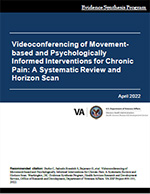
|
Recommended citation: |
Download PDF: Complete Report, Executive Summary, Report, Appendices
Findings from a single noninferiority trial assessing acceptance and commitment therapy indicate videoconference-delivered pain management is a possible substitute for in-person care. The outcomes reported included 5 pain measures, 2 quality-of-life measures, and 1 function measure. Further research is needed to investigate the effectiveness of behavioral and movement-based videoconference interventions for chronic pain. Findings of a horizon scan show several promising studies focused on effectiveness of videoconference-delivered non-pharmacological chronic pain care.
Nonpharmacological approaches to pain management may be well-suited for the virtual care environment. Yet, it is not widely understood if the effectiveness of this treatment modality translates to the virtual environment when delivered via videoconferencing. Thus, the purpose of this review is to examine the effectiveness of nonpharmacological chronic pain management interventions delivered via videoconferencing compared to in-person care.
Only 1 study met inclusion criteria and evaluated acceptance and commitment therapy delivered via videoconferencing and in-person. Findings from this single noninferiority study indicate that the impact of virtually-delivered pain management is a possible substitute for in-person care. The outcomes reported included 5 pain measures, 2 quality-of-life measures, and 1 function measure. The evidence was rated as low certainty. To augment the dearth of identified literature, we conducted a horizon scan of planned studies. The 1 pilot study and 3 protocol papers identified on this topic indicate that future research will focus on real-time physical therapy, group exercise, guided exercise, reflection, and relaxation techniques. Of the 6 protocols identified via trial registration databases, 2 are psychologically informed intervention studies, 3 are movement-based intervention studies, and 1 combines these approaches. These protocols similarly suggest that this is a burgeoning field of research likely to yield results in coming years.
Systematic Review: Implementation of Psychotherapies and Mindfulness-based Stress Reduction for Chronic Pain and Chronic Mental Health Conditions (Management Brief)
Burke C, Salcedo Rossitch S, Bejarano G, et al. Videoconferencing of Movement-Based and Psychologically Informed Interventions for Chronic Pain: A Systematic Review and Horizon Scan. Telemedicine and e-Health. Published online February 14, 2023. DOI: http://doi.org/10.1089/tmj.2022.0308.